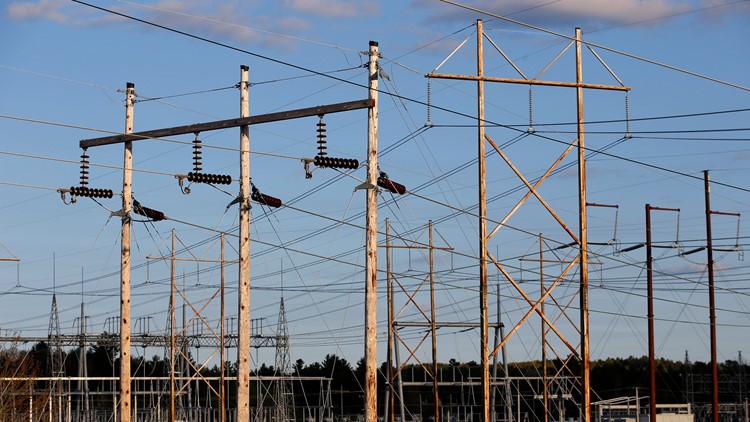AUGUSTA, Maine — Gov. Janet Mills said Friday that Hydro-Québec has signed a formal binding commitment with Maine that will result in enough clean energy to power approximately 70,000 homes or 10,000 businesses in Maine. Hydro-Québec will sell electricity directly to Maine at a discounted price via the New England Clean Energy Connect (NECEC).
As part of the agreement, $170 million in benefits negotiated last year— including rate relief for Maine consumers and incentives for broadband, electric vehicle charging stations, and heat pumps—will be accelerated.
“I have heard people say that the NECEC will deliver power directly to Massachusetts but not to Maine,” Mills said in a statement. “With this new commitment, we ensure that Maine consumers access power directly from the line at a discounted price.”
Thorn Dickinson, President & CEO of NECEC Transmission LLC., said in a statement, “The agreement between the state of Maine and the Hydro-Québec power company to bring additional renewable energy from the Clean Energy Corridor directly to Mainers just adds to the long list of reasons why the project is good for Maine."
Here's a breakdown of the expanded benefits:
Mills wrote to Hyrdo-Québec in a letter on March 6 to convey to the company that Mainers are concerned that the power will be transmitted across Maine directly to Massachusetts and not to Maine consumers.
"I understand that not all the electricity transmitted over this line will be necessary to fulfill Hydro-Québec's contractual commitments to Massachusetts, and that any such power not delivered for this obligation could instead be redirected to Maine consumers," Mills wrote in the letter to Hydro-Québec President and CEO Eric Martel.
Read the letter here:
The Mills administration says other benefits negotiated in the 2019 Stipulation approved by the Public Utilities Commission (PUC) include scholarships for Maine youth, host community funds, electric grid stability and improvement, and a preference for Maine workers, among other benefits.
Under the commitment, Hydro-Québec will sell 500,000 megawatt (MWh) hours per year of hydroelectricity to Maine via NECEC, if permitted, at a discount of four dollars per MWh (US$4.00/MWh).
To implement the commitment, the Governor’s Energy Office (GEO) and Hydro-Québec will finalize either:
- A 20-year power purchase agreement with one or more Maine Buyer(s) at the discounted price; or
- If a power purchase agreement is not entered into, Hydro-Québec will pay a total of $40 million in installments over 20 years to an entity designated by the GEO that ensures benefits to Maine retail energy customers.
Read the GEO commitment here:
RELATED: More than $300 million in new contracts awarded for controversial transmission line project
In addition to the commitment to sell power to Maine, and pending review by the PUC, Hydro-Québec has agreed to accelerate the start of payments to begin upon the issuance of final permits rather than the commercial operation date. The following are the funds to be provided by Hydro-Québec:
- Rate Relief: $140 million in installments over forty years, which includes $90 million of rate relief for retail electricity customers within Central Maine Power service territory and $50 million for the Low-Income Customer Benefits Fund to reduce energy costs for low-income customers.
- Broadband: $10 million to capitalize a Broadband Fund to provide grants that support the implementation and maintenance of high-speed broadband infrastructure in the communities that host the transmission facilities. Payments will be made in installments over five years.
- Heat Pumps: $10 million for the installation of high-efficiency air source heat pumps, that may include targeted initiatives to reach low-and moderate-income individuals in Maine. Payments will be made in installments over five years.
- Electric Vehicles: $10 million for the Hydro-Québec EV Fund to fund the deployment of fast charging infrastructure in Maine. Payments will be made in installments over five years.
The new commitment from Hydro-Québec builds on the $258 million stipulation negotiated last year with several parties, including the Office of the Public Advocate and the Industrial Energy Consumer Group with the assistance of the Mills Administration, and will enhance the benefits inherent in NECEC, the construction and operation of which will:
- provide economic development, educational scholarships, property tax payments, and the creation of more than a thousand jobs during development;
- suppress electricity prices, deliver rate relief for Maine consumers, and strengthen the New England electric grid to avoid blackouts and brownouts, and;
- reduce carbon emissions by as much as 3.6 million metric tons per year, or the equivalent of taking 700,000 cars off the road, according to a study commissioned by the PUC.
The Mills administration says the Maine Department of Environmental Protection – through its independent permitting process – "has required an unprecedented level of environmental protection and compensatory land conservation for the construction of NECEC, including the permanent conservation of 40,000 acres in western Maine and limiting the corridor’s width from 150 to 54 feet at its widest point in Segment 1."
Mills directed the Governor’s Energy Office to sign onto the initial NECEC Stipulation in February of 2019.



